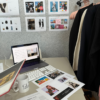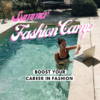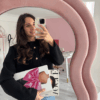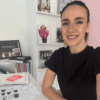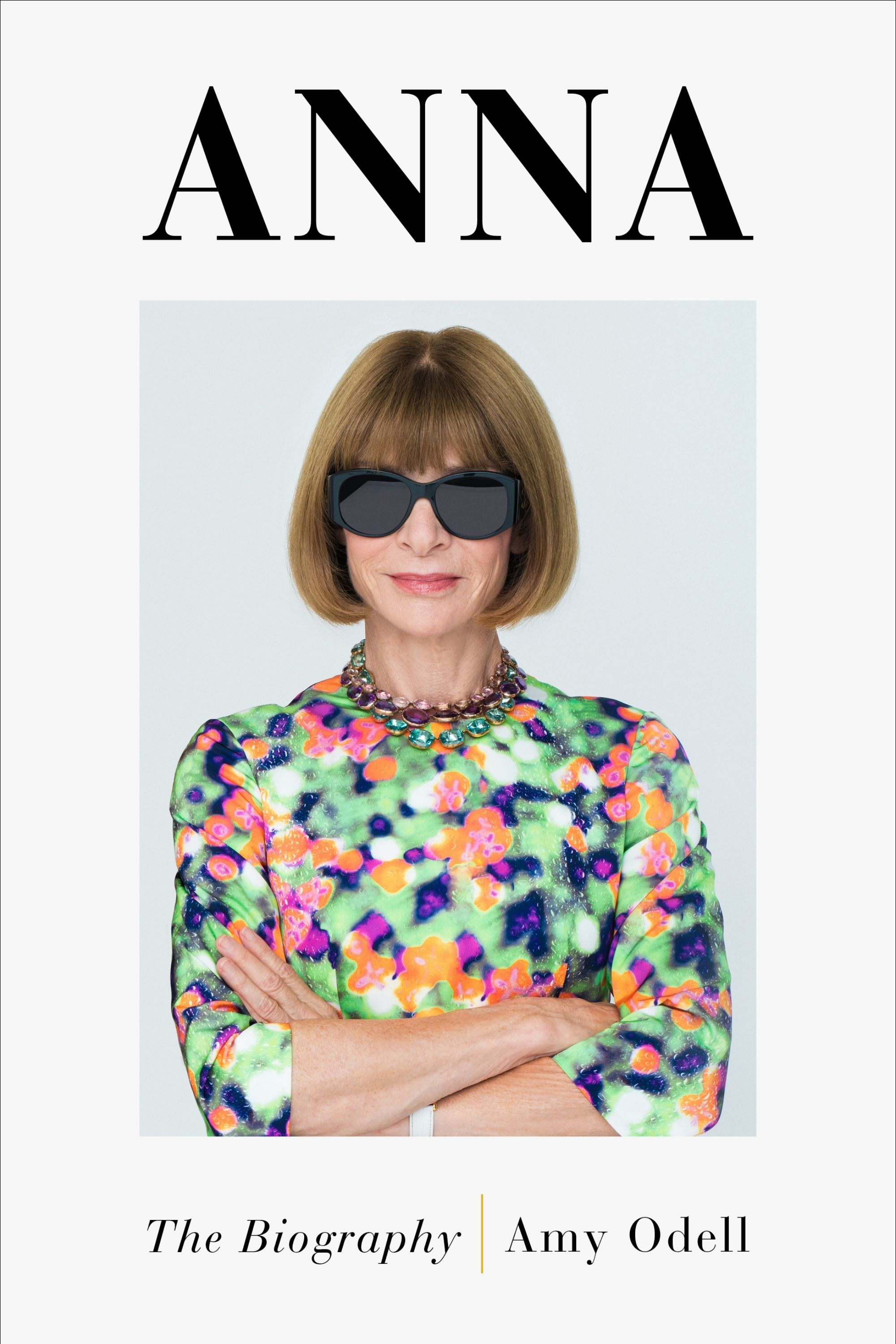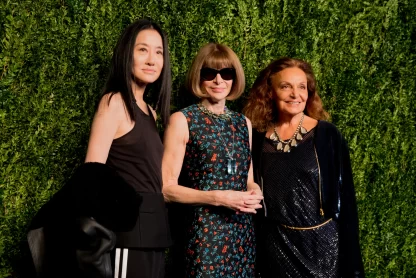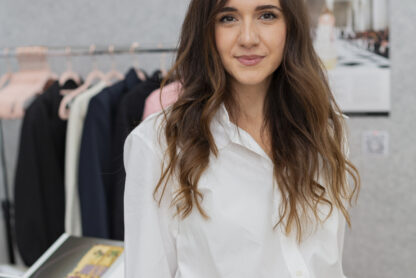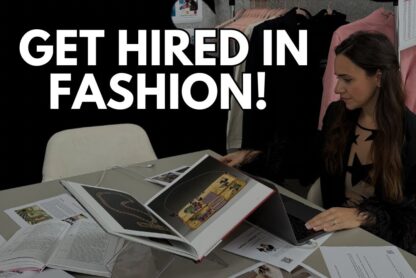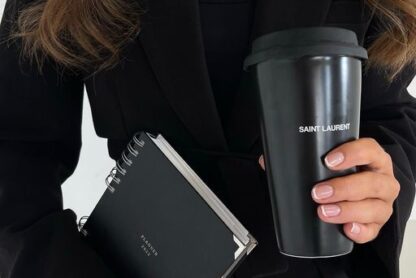We all know Anna Wintour as the iconic editor-in-chief of Vogue. You might recognize her for the bob cut, her black glasses and her floral dresses. But she’s not only a strong leader with an extraordinary work ethic, and she’s neither so cold in reality. I’ve been fascinated by Anna Wintour for a long time and if you read my book Your Fashion Dream Plan you know that there is an illustration as well as a chapter with her name. So I was very excited to sit down with Amy Odell who has just published her book Anna the biography.
Amy has built up Anna Wintour’s story by interviewing more than 250 people over the past 3 years. In this podcast episode we chatted about Anna Wintour: why she is so powerful in fashion but also why people beyond fashion ask for her opinion (including Serena Williams and Bradley Cooper when he had to cast for A star is born). We also talked about the future, if there is a Vogue without Anna Wintour, who could replace her and if the next editor in chief will be as influential as Anna.
Listen now the episode on Spotify and Apple Podcast or keep scrolling if you prefer to read the transcript.
How did your career start in the fashion industry? Can you tell us a little about your background?
I studied journalism at NYU in New York and I moved here from Austin, Texas when I was 18 to go to school where I fell in love with journalism and media right away. I really started covering fashion for New York Magazine as a freelance party reporter. So I would go out to red carpet events and interview celebrities. I did a lot of fashion events like fashion week, and project runway events. Which was huge at the time, this was like 2007. Then in 2008, I became a full-time blogger at The Cut, which was a new blog for New York Magazine and I was the first full-time writer there. I was in this role for around 4 years and that was really where I specifically ended up writing about fashion.
You have just released your new book, Anna the Biography. Why Anna Wintour?
I am among many people who are fascinated by Anna Wintour. If you think about the business world broadly, not just fashion or media but business in general, her tenure is unusual. She has been at Vogue since 1988, so that will be 34 years this summer and if you look at other business leaders like Jeff Bezos for instance, he left Amazon after 27 years. So it’s one thing to get to the top but it’s quite another to stay there, particularly for as long as Anna has. Despite having that public position for so so long, she is someone who has remained an enigma. Even to people who know here well.
A lot of people also know Anna from The Devil Wears Prada, the film. But that is a really one-dimensional view of a woman who many people described to me as complicated. And I was surprised during the reporting to learn so many things about her, such as hearing her described as the matriarch of her family, or that she wants to be remembered for her philanthropic work and not for her magazine work. I was surprised to hear her described as a grandmother and a dog lover.
I think a lot of people do not think about Anna Wintour as a human being, they think about her as this character, who has been kind of dehumanised through many years of media reports and the Devil Wears Prada caricature of her. And this book, reveals a different side of her that we really haven’t really seen before.
How has Anna become so powerful? What are the main changes that made her one of the most or even the most influential person of the fashion industry?
Some of that, as I learned through my extensive research is grandfathered into the role of Editor In Chief of Vogue. The EIC of Vogue has what I can tell historically been the leader of the fashion industry. You can look back to Edna Woolman Chase who started working at Vogue in 1895 and then became EIC 7 years after that, in the early 1900s. She really kind of served as the leader in the fashion industry, particularly in New York. And that power was really expanded upon over the years, Diana Vreeland really occupied that role in the 60s, and so did Grace Mirabella in the 70s. And you know these women are influences on fashion houses like which designers to appoint, much in the way that Anna does.
But from what I could tell, Anna really expanded the influence of this role. She is someone who has an extraordinary network of people that she has built up over the course of these 34 years across industries. Not just fashion, but politics, entertainment, and sports. I have a number of stories in the book that really showcases her influence. For instance, Serena Williams considers Anna to be a close confidant and described calling her when she was struggling with tennis before going on to win Wimbledon based on the advice that Anna gave her. I have another example in the book of Bradley Cooper sending over his script for A Star Is Born before he had cast Lady Gaga in the role, to get Anna’s input on it. These are the kind of things that are happening behind the scenes all the time that is not really discussed in the media and I was surprised to learn this influence extends to so many other industries.
Why do you think she has the power to influence other fields and not just fashion?
I think that a lot of people really trust her taste and she is a very savvy business women and I think her strength is really that she’s able to communicate very effectively with Vogue creative and business people. There are a lot of people in fashion who are fantastically creative and brilliant but they don’t have that ability that she has to talk to business people and deliver advice that they want to take. I talk in the book extensively about all those fashion editor jobs that she had before she got to American Vogue. She held so many other positions, she worked her way up, so she understands that and how that world works. So she’s really able to handle both sides of the business.
We all see Anna Wintour as this strong figure of fashion, now you have done your research for the book can you tell us more about her work ethic?
Anna Wintour’s work ethic is extraordinary. I mean she gets up at 4 am some days and she sometimes starts emailing her team before 6 am. So she reads the news, exercises, gets ready for her day by getting her hair and makeup done professionally at home, and gets driven to the office where she typically has her breakfast waiting for her. Where her assistants are there ready to go.
People tell me that she gets more done in a day than anybody they have ever seen. When she became Artistic Director of Conde Nast, meaning she gained oversight of titles beyond Vogue at the company in 2013. People said they thought that when that happened, she would be less involved with vogue. However that wasn’t the case, she just kind of started getting up earlier and finding more hours in her day to get even more work done. So she’s incredibly efficient with her time. Something that a lot of people said is if you get a 15-minute meeting with her, that’s considered to be quite long. She’s not someone who likes to sit in long meetings and waste away. She wants people to get answers from her quickly and move on to the next thing. This struck me so much about her, but she’s also someone who responded to emails right away, she doesn’t let things linger for a long time.
Also reading your book, you mention she might not have all the attention she has got over her work ethic if she was a man?
Yes, some people believe that and I think the readers have to decide if they agree with that. A number of people said that if she was a male executive her methods would not come under some of the harsh scrutinises that they have come under. You know one of the things I describe in the book for instance is how she got this reputation for being this icy figure, and how she was called over the course of her career ‘nuclear Wintour’. That really began in the mid-’80s when she became EIC of British Vogue in 1986. She went from New York over to London for her first EIC job. She probably didn’t want to stay in that job for too long, as she had a new baby and her husband was in New York. So there were practical concerns for her about getting back to New York but also she really wanted to edit American Vogue.
So she gets this job at British Vogue and she probably felt like she has to turn the magazine around fast. It’s in her nature to get things done efficiently. So what did she do? She cleaned out the staff, got rid of a lot of people and completely changed the magazine. She changed the look and the fashion totally, before her it was kind of a romantic feel. It went from photos of women with horses and twigs in their hair to women in suits chasing taxis. She totally changed the front of the book, cut columnists, and brought in new people. And she did that all very fast. It was just really unlike the culture of British magazines at the time. The EIC didn’t just come in from New York and totally change the staff and everything about a magazine and that’s what she did. This really kind of led to her reputation.
So would that have been the case if she was a man? It’s hard to say, but it’s something a lot of people brought up a number of times in my interviews.
I guess at this point, she knows about the book, do you know if she has read it or had anything to say at this point?
She knows about the book because she helped with the book after I had been slogging away on it for about a year and half and interviewed more than 100 people. Her office found out about it and the result of our conversation about the book was that they sent over a list of close friends and colleagues for me to interview. I asked for her permission for a number of other people to talk to me and she granted that. But I don’t know if she’s read the book or what she thinks of it. I can only venture to guess, but I’m just as curious as anyone to know her reaction to it.
Why do you think she has not published her own biography yet?
So I did send several invitations to formally interview Anna and she declined them all. People say that she doesn’t like to talk about herself so that could be why. A number of her close friends said she doesn’t want to sit and reflect on the meaning of Anna Wintour, the way that many of us do. A number of people said she has no plans on writing a memoir. Based on this extensive interviewing I did with people who had never even talked about her on the record before, gave the impression she didn’t want to do this. She is so focused on her job and that’s what she loves. Something that really struck me about her, is a lot of people who get to this high position and become fixated on self-promotion. But the way people talked about her I never got the impression that that was more important to her than her job herself.
It’s admirable that you didn’t give up despite her rejecting the request to talk directly
It would have been unusual for her to sit for an interview with me, she doesn’t want to sit and talk about herself, she doesn’t want to spend a long time in meetings. You know an interview for a biography you would want a lot of of time for that so, I think a lot of things in her nature go against sitting and doing an interview for a biography. But by having her close friends and colleagues speak with me I was able to learn more about her than most journalists who have previously written about her. It really opened the floodgates when these people were approved, as these individuals who once hung up the phone or denied to speak then spoke to me. The book is written in an objective way, so it’s not necessarily about then fawning over her, but just having people who have had experience with her.
As an experienced journalist, you have interviewed all these people how did you know when these people were telling the truth?
I have been a journalist for more than 15 years and I have never faced quite this challenge before. The human memory is a challenge with a biography. So if I asked you to describe something that happened 1 year ago, how much detail could you give me? Anna is 72 years old, so with the biography, you’re asking people to describe things that happened 50, 60 years ago and it’s hard for people to remember. For a book, you want cinematic detail, you want to know what they looked and sounded like, which is very hard. That was really the challenge, so where people were unsure I spent a lot of time interviewing many sources and asking people ‘do you remember this being the case’, and a lot of people would say “I think I remember it this way but check that.” So that was a unique challenge. I never got the sense people were out right lying.
Do you think there is someone nowadays that is close to Anna’s power or influence in fashion?
At the moment, no. Only because I think that the EIC of Vogue occupies that spot. Because that’s been the case for basically a century. The EIC of Vogue occupies that spot as the leader of the fashion industry in general and I do believe that when Anna moves on from the job, which she will, she has to because she’s a human being. A new person will come to occupy that spot.
Is there Vogue without Anna? Can the next EIC be as powerful as Anna?
That’s the big question right. I think that yes the next person can be as powerful as Anna but I don’t think it’s going to happen overnight. In the same way, that it didn’t really happen overnight for Anna either. As I was describing earlier this network of people she has who reach out to her and rely on her, we see this. At the latest Met Gala, they walk up the steps and shake her hand and they are there because she has invited them. It takes time to build up the influence and network, but I think it can be done.
I think the challenge for the next editor is going to be like no other EIC has had to deal with before. We have the internet now, which has completely changed power dynamics and media consumption habits. If you want to know what’s going on in fashion in 2022 there is a number of sources from TikTok to Vogue. When Anna took over in 1998 there was none of that. If you wanted to know what was going on in fashion you had Vogue and Harpers Bazaar or other magazines. So that will be the challenge for the transition. How is the next EIC going to leverage Vogue so that it’s dominant on all of these platforms and can outshine every other publication? What will be the next vision to allow Vogue to stay on top?
Who do you think will be the next person to replace Anna?
So, I would look to history. One of the names that comes up a lot as someone who could replace Anna is Edward Eninful, the EIC of British Vogue. People love what he’s doing over there, he’s created a lot of memorable images. His work is really resonating with the audience and his name has come up in news reports as a possible successor to Anna. What I will say about that is, that Corrine Roitfeld used to come up as a possible successor to Anna and that never happened, so these reports are often wrong. And in the past with EIC transitions, the person who has gotten the job has always worked at Vogue in a lesser role before, so Anna Wintour was Creative Director at Vogue from early to mid-’80s and she worked in other EIC roles at Conde Nast before her role at American Vogue. Diana Vreeland was at Vogue before she came to EIC, so this was always the case in all EIC transitions in Vogue history. So I would be surprised if they picked someone completely out of the left field who had no history working at Conde Nast or American Vogue.
What have you enjoyed the most about writing this book? How many years has it taken you to put all the information together and interview people?
I started this book in late 2018 and it’s 2022, so it’s been about 3 and a half years I guess. I would say it was really a 3-year process of intense research and writing. I enjoyed it so much but it was really challenging. It’s hard to write about people in power. But Anna is someone who I have long been fascinated by, so I loved doing the interviews and hearing stories about her, that probably no one has heard before. Putting it together was the difficult part, I had probably thousands of pages of transcripts and then you have to put this into a digestible narrative for the reader. Once you get people on the phone, it was fun to hear their stories, prepping for the interviews was hard as you need specific stories and thoughtful questions when you’re up against the human memory. I made this mistake in the beginning when you call someone and ask ‘ so what was she like, what do you remember about her?’ you get almost no information. So that part was really fun. One of the tedious parts was putting the citations together at the end, but I wanted people to know all of this is coming from somewhere it’s not just made up gossip.
How many people said yes and how many people said no to interview requests?
I interviewed over 250 people for the book and I stopped counting after 250, so it was somewhere between 250 and 300. I can’t recall how many people I approached overall. I went weeks where I would get just no’s, that was demoralising and hard but you have to keep trying. So after I got a lot of no’s in the beginning, I thought okay how can I start getting some yes’s. This was my first biography, so I was figuring this out as I went along. I thought maybe if I go back to the beginning of her life and I find people from her earlier life they will have more distance from her and be more open to speaking with me. That proved to be a good assumption. So I started my reporting over and worked my way forward in time, which was a successful strategy.
How did you find the first people in the beginning?
So one of the things you can do is search newspaper archives for articles about people. She’s a prominent person, so a number of profiles have been written about her over the years. You can look at those for details like, where did she go to school? And then you can look up the school and see what information you can find. So Anna went to a school in London l and they have some archives online available to researchers. I was able to access the student magazine from the time that she was there in the early to mid-60s and that had information in it about the girls she played netball with. These are the kinds of research you have to do, then when you get people on the phone you have to ask, who else should I talk to.
Did you do all the interviews via phone and email? Or was it possible to travel and meet in person?
So most of them were done over the phone because a lot of the research was conducted during the pandemic, but some were done in person. But due to the pandemic and I was also pregnant, I had two babies over the course of working on the book so my ability to travel was limited with a newborn.
Thank you so much to Amy Odell for this intriguing interview and a huge congratulations on becoming a New York Times bestselling author!
